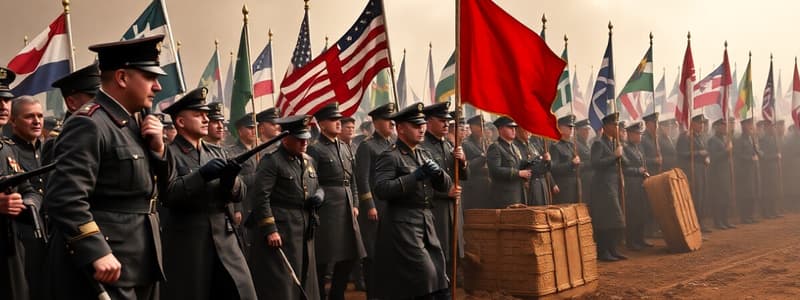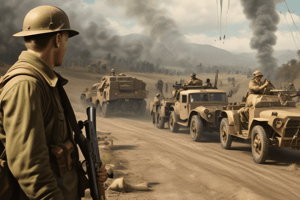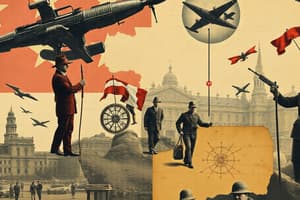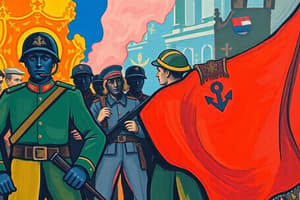Podcast
Questions and Answers
What were the psychological and social impacts of Ukrainian internment on Canadian communities during WWI?
What were the psychological and social impacts of Ukrainian internment on Canadian communities during WWI?
The psychological impact included lasting trauma and stigmatization, while the social consequences involved the disruption of familial and community ties.
How did Canada’s military participation in WWI shape its reputation on the global stage?
How did Canada’s military participation in WWI shape its reputation on the global stage?
Canada's military participation enhanced its reputation as a formidable fighting force and contributed to its emergence as a nation in its own right.
What effects did the introduction of chemical warfare at Ypres have on public perception of the war?
What effects did the introduction of chemical warfare at Ypres have on public perception of the war?
The use of chemical warfare caused horror and revulsion, leading to increasing calls for peace and a rethink of the war's morality.
In what ways did civil liberties movements emerge as a response to wartime measures in Canada?
In what ways did civil liberties movements emerge as a response to wartime measures in Canada?
How did public opinion on the war shift in Canada as the conflict progressed?
How did public opinion on the war shift in Canada as the conflict progressed?
How did propaganda efforts contribute to shaping Canadian public opinion towards the war?
How did propaganda efforts contribute to shaping Canadian public opinion towards the war?
What role did the perception of Canadian veterans play in shaping post-war attitudes towards military service?
What role did the perception of Canadian veterans play in shaping post-war attitudes towards military service?
To what extent did wartime experiences contribute to a shift in gender roles in Canadian society?
To what extent did wartime experiences contribute to a shift in gender roles in Canadian society?
What were the impacts of Ukrainian internment during WW1 in Canada?
What were the impacts of Ukrainian internment during WW1 in Canada?
How did WW1 contribute to Canada's military reputation on the world stage?
How did WW1 contribute to Canada's military reputation on the world stage?
What role did chemical warfare play in the Battle of Ypres?
What role did chemical warfare play in the Battle of Ypres?
How did WW1 affect civil liberties in Canada?
How did WW1 affect civil liberties in Canada?
What was the general public opinion in Canada regarding participation in WW1?
What was the general public opinion in Canada regarding participation in WW1?
In what ways did WW1 impact the women's rights movement in Canada?
In what ways did WW1 impact the women's rights movement in Canada?
How did the chemical warfare experienced at Ypres shape Canadian military tactics in subsequent battles?
How did the chemical warfare experienced at Ypres shape Canadian military tactics in subsequent battles?
What were the long-lasting social effects of the war on Canadian society?
What were the long-lasting social effects of the war on Canadian society?
How did Ukrainian internment camps during WWI impact the societal perception of loyalty in Canada?
How did Ukrainian internment camps during WWI impact the societal perception of loyalty in Canada?
In what way did the Battle of Ypres contribute to Canada’s international military reputation?
In what way did the Battle of Ypres contribute to Canada’s international military reputation?
What was the significance of chemical warfare introduced at the Battle of Ypres for military tactics?
What was the significance of chemical warfare introduced at the Battle of Ypres for military tactics?
How did the conditions faced by Canadian troops at Ypres affect their morale?
How did the conditions faced by Canadian troops at Ypres affect their morale?
How did public opinion in Canada shift regarding the war after the Battle of Ypres?
How did public opinion in Canada shift regarding the war after the Battle of Ypres?
What role did the Battle of Ypres play in the development of civil liberties movements in Canada?
What role did the Battle of Ypres play in the development of civil liberties movements in Canada?
In what ways did Canada’s military performance at Ypres redefine national identity and pride?
In what ways did Canada’s military performance at Ypres redefine national identity and pride?
How did the legacy of the Battle of Ypres influence public understanding of the sacrifices in World War I?
How did the legacy of the Battle of Ypres influence public understanding of the sacrifices in World War I?
Flashcards are hidden until you start studying
Study Notes
Causes of WWI
-
Alliance Systems:
- Complex web of alliances, such as the Triple Alliance (Germany, Austria-Hungary, Italy) and the Triple Entente (France, Russia, Great Britain).
- Alliances obligated nations to defend each other, even in disputes that did not directly involve them.
- This intricate system helped create a domino effect, where a conflict between two nations could rapidly escalate into a large-scale war.
-
Nationalism:
- Intense feelings of national pride and superiority, leading to competition and animosity between nations.
- Increased tensions, particularly in the Balkans, where various ethnic groups desired independence from empires, such as Austria-Hungary.
-
Economic Rivalry:
- Competition for colonies, resources, and trade routes fueled animosity between European powers.
- Germany’s rapid industrialization and economic growth challenged Britain’s dominance, creating tension.
-
Assassination of Archduke Franz Ferdinand:
- Triggered a chain of events leading to war.
- Archduke Ferdinand, heir to the Austrian throne, was assassinated by a Serbian nationalist in Sarajevo, Bosnia.
- Austria-Hungary, blaming Serbia, issued an ultimatum, leading to the declaration of war by Austria-Hungary against Serbia.
-
Imperialism:
- The quest for colonies and overseas territories fueled tensions and rivalries, particularly between Britain and Germany.
- Competition for resources, markets, and strategic locations intensified conflict.
-
Militarism:
- A focus on building up military strength, resulting in an arms race.
- Nations competed for military superiority, creating a climate of fear and suspicion.
- The massive increase in military spending drained resources and contributed to political instability.
-
Balkan Tensions:
- Complex and volatile region, with various ethnic groups vying for independence from the Ottoman Empire and Austria-Hungary.
- A powder keg of tensions, contributing significantly to the outbreak of war.
-
Colonial Aspirations (Britain vs. Germany):
- The British Empire, already a global powerhouse, saw a rising Germany as a competitor.
- Germany's ambitions for colonies threatened Britain’s dominance and fuelled animosity.
Canada’s Reactions to WWI
- Duty to Support Britain:
- Canada, a member of the British Empire, felt a sense of duty to support Britain in its time of need.
- A strong sense of loyalty and shared history bound Canada to Britain.
Canada's Involvement in WWI
-
Canadian National Identity:
- The war significantly impacted Canadian identity, leading to a growing sense of national pride and independence.
- Canadian troops earned recognition on the world stage, distinguishing themselves for their bravery and sacrifice.
-
Social and Economic Implications:
- The war had profound social and economic impacts on Canadian society.
- Mobilization of Canadian men led to labor shortages and a surge in the Canadian economy.
- Women took on roles traditionally held by men, contributing to the war effort and challenging gender roles.
-
Canadian Women's Contributions:
- Women participated actively in the war effort, working in factories, taking on roles traditionally held by men, and serving as nurses.
- Their contributions challenged traditional gender roles and demonstrated their capabilities.
-
Indigenous Participation:
- A significant number of Indigenous men volunteered for the war effort, contributing to Canada's military operations,
- Some Indigenous men gave up their status to enlist, highlighting the complexities of Indigenous participation in WWI.
- Some Indigenous communities had mixed feelings about the war, with some seeing it as a chance to prove their loyalty to Canada, while others viewed it as a distraction from the ongoing struggle for their rights.
-
Priority for Troops:
- The Canadian government prioritized sending troops to Europe, focusing on military contributions rather than expanding domestic industries.
- The government believed that military victory was paramount and this was the best way to contribute to the Allied cause.
-
Propaganda and Recruitment:
- War propaganda played a crucial role in recruiting Canadian volunteers.
- Posters, speeches, and media campaigns were employed to encourage Canadians to enlist, often depicting the war as a righteous struggle for freedom and democracy.
- The government used patriotic appeals to mobilize the public.
-
French-Canadian Perspective:
- French-speaking Canadians, historically less connected to the British Empire, had a more mixed view of the war. Some felt it was a British conflict that did not directly concern them, while others embraced the opportunity to prove their loyalty.
Battle of Ypres
-
Canada's Global Reputation:
- The Battle of Ypres played a crucial role in establishing Canada's reputation on the global stage.
- Canadian troops distinguished themselves for their bravery and tenacity, particularly during the first use of chlorine gas.
- Canada demonstrated its commitment to the Allied cause and its growing military capability.
-
Chemical Warfare:
- The introduction of chemical weapons at Ypres significantly impacted future battle tactics.
- Gas attacks, while initially effective, led to the development of gas masks and other protective measures.
- The psychological impact of chemical weapons on soldiers and civilians was profound.
-
Morale of Canadian Troops:
- The harsh conditions at Ypres, characterized by intense shelling, trench warfare, and gas attacks, severely tested the morale of Canadian troops.
- Despite the difficulties, Canadian soldiers demonstrated remarkable resilience and determination.
-
Tactical Advantages and Disadvantages:
- Canadian troops faced both advantages and disadvantages at Ypres.
- Their strong training and leadership allowed them to hold their ground against German advances, but the constantly changing battlefield conditions made it challenging to maintain a tactical advantage.
-
Canadian Recruitment and Public Opinion:
- The Battle of Ypres had a significant impact on Canadian recruitment and public opinion about the war.
- Stories of Canadian bravery and sacrifice fueled patriotism, leading to increased volunteerism.
- However, the heavy casualties also caused an undercurrent of concern and worry about the war's cost.
-
British Perception of Canadian Soldiers:
- Canada's performance at Ypres left a lasting impression on British perceptions of Canadian soldiers.
- Their courageous defense against German attacks solidified the image of Canadian troops as skilled, dedicated, and reliable.
-
Canadian Pride and Identity:
- The Battle of Ypres played a crucial role in redefining Canadians' sense of national pride and identity.
- The sacrifices made by Canadian soldiers, along with their heroic actions, solidified Canada’s commitment to the Allied cause and strengthened their sense of national belonging.
Importance of WWI
- Continuity and Change:
- The war marked both continuity and change for Canada.
- While Canada's initial entry into the war was based on a strong sense of loyalty to the British Empire, the war experience itself fostered a growing sense of national independence and self-determination.
Studying That Suits You
Use AI to generate personalized quizzes and flashcards to suit your learning preferences.




